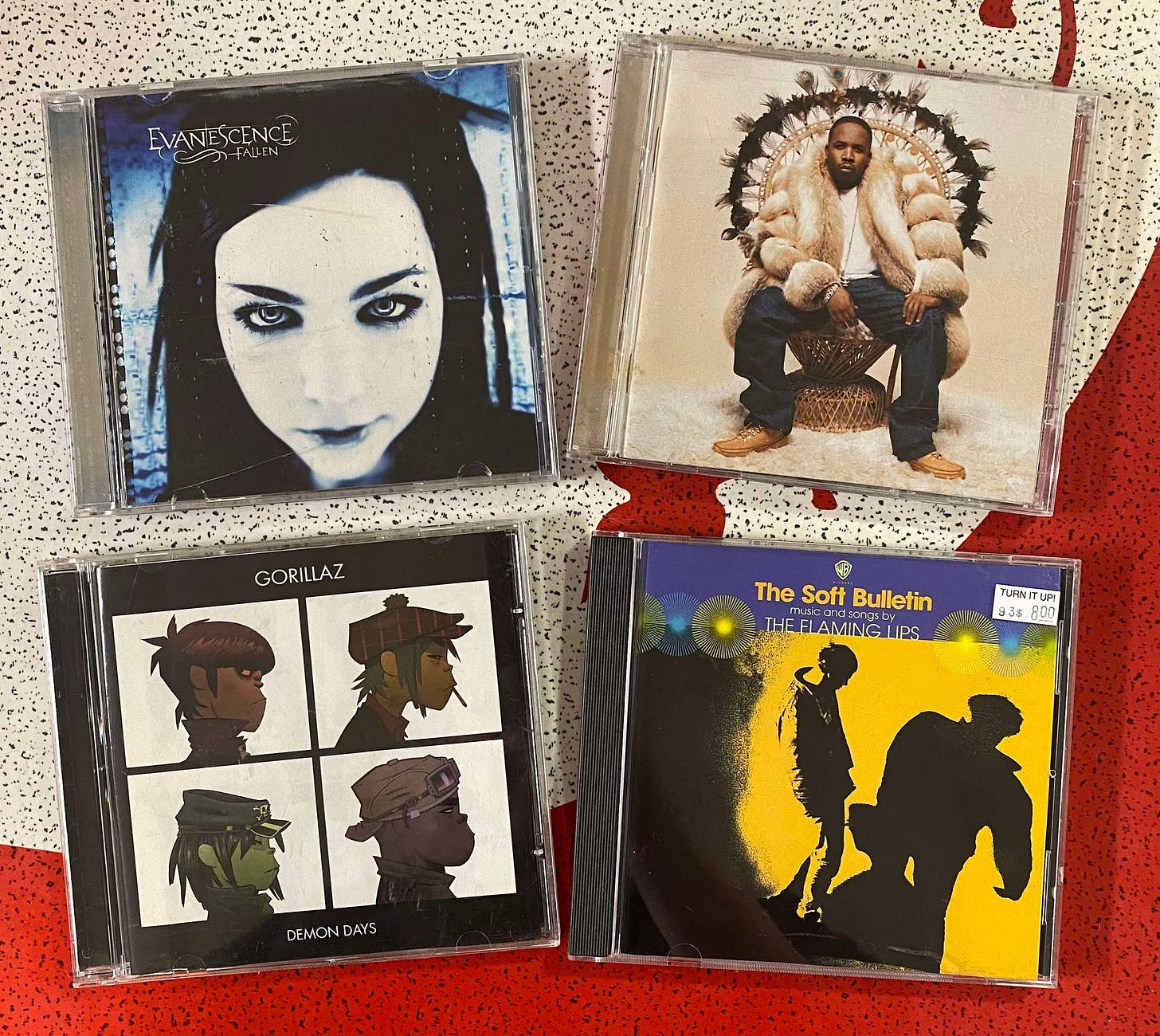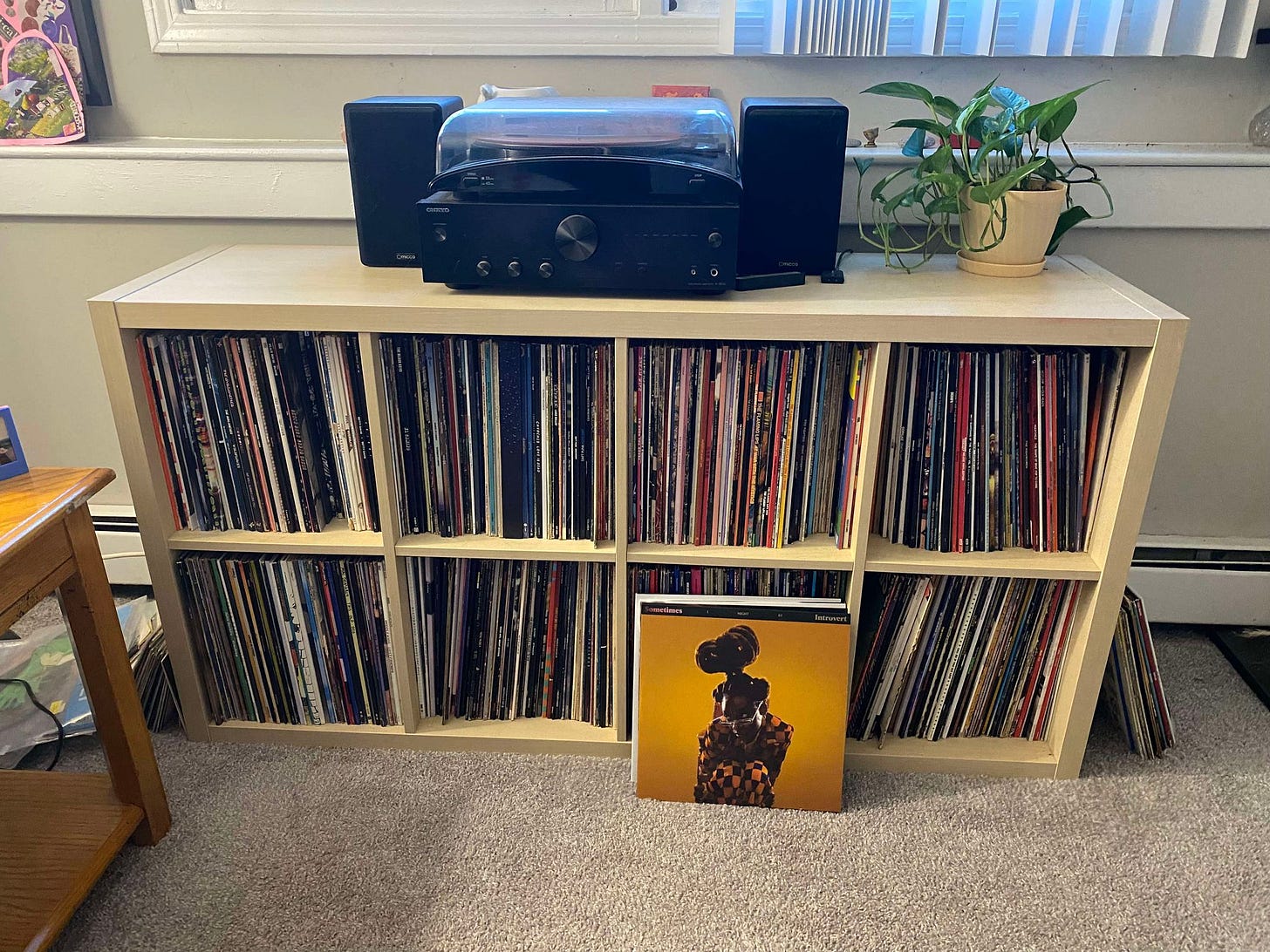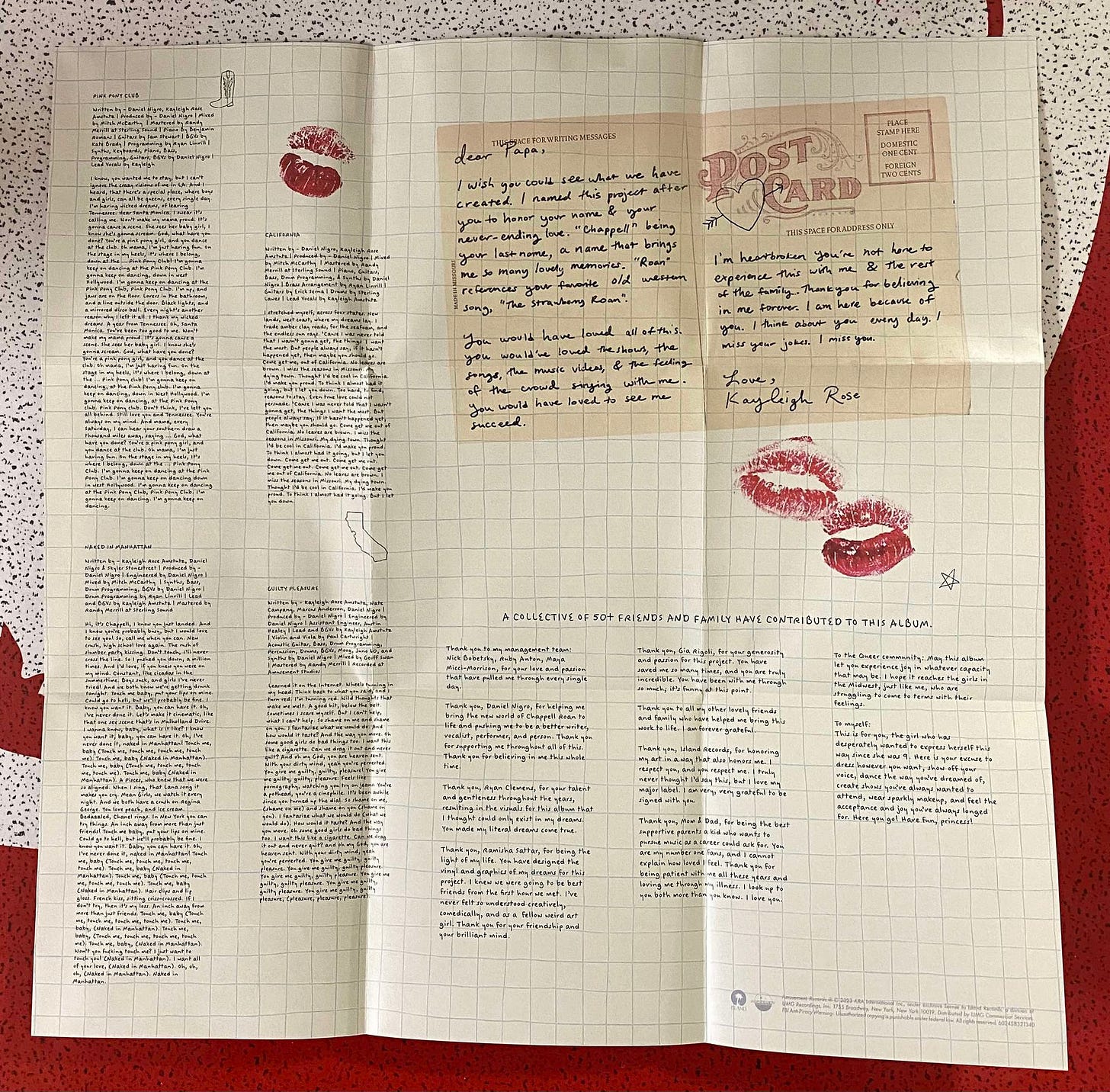Why I Started Collecting CDs in 2024
On the disposability of art and underconsumption-as-activism.
Real quick up top: I’m now giving all my Substack income to help Ghazal and her family survive in Gaza. In August 2024, we raised over $100! Thank you so much to my paid subscribers! If you want to help too, consider upgrading to the paid tier; if you do, you’ll get four hot takes per month instead of two!
Those who’ve followed me for a while know that I have a massive vinyl record collection. Music has always been a huge part of my life, so I believe that a) supporting artists financially is important and b) that there is value in physical media. Vinyl collectors love to wax (pun intended) poetic about the ritual of picking out an album, pouring over the artwork, placing a disc on the platter, setting the needle down, and enjoying a piece of music to the maximum extent possible; I regret to inform you that I am one of those nerds.
At the same time, purchasing polyvinyl chloride (PVC) is becoming less defensible as time goes on. The material is among the most toxic polymers out there, slowly evolving toxic gases over the course of their lifetime and being completely unrecyclable as a result of their trademark chlorine atom (and at least a dozen other additives, including endocrine-disrupting phthalates). Even its manufacturing is dangerous; those who read environmental news may recall the East Palestine, OH disaster of 2023, where vinyl chloride monomer (VCM) was spilled onto a low-income neighborhood after a Norfolk Southern trail derailment. The 200+ pounds of vinyl sitting in my living room are more of a liability than an expression of my tastes as an art curator: if my apartment ever caught fire, the hydrochloric acid that would form as a result of evolved chlorine meeting moisture in the air would kill me long before the flames themselves.
Nevertheless, my collection matters to me; I haul this plethora of pressed pucks from apartment to apartment whenever I move, and whenever I do, someone (usually a friend who I’m paying to help carry heavy boxes of the things in exchange for pizza) will make a hilarious remark along the lines of, “hey, have you heard of these things called ‘mp3’s?” This might reveal the average age of my friend group, since the “Gen Z and younger” version of that joke might instead refer to streaming services. As a TikToker-turned-Substack-author who’s growing increasingly concerned about the role algorithms play in shaping human life, I think a lot about the mediums in which we consume content. By extension, something I’m thinking about lately is the devaluing of art, and by extension artists, given the disposability of, well, everything. Chappell Roan, as a recent example that I wrote about, is to be deemed problematic and tossed aside once she doesn’t want to pose for a picture or give her fans a hug, as though one of the most groundbreaking artists of our generation is merely a doll that no longer speaks whenever you pull her string.
The dehumanization of celebrities is nothing new, but I have to wonder whether music streaming (and the immediate access to all media in general) is a contributing factor to the particularly heinous fan behavior over the past few years. We no longer pay $14 for a single album (most of that money going to an artist), we pay $14/month for pretty much every album we could ever want to listen to (and artists are making fractions of a cent per stream). Ditto for movies and television; where in the olden days writers and actors would make their living off residuals from DVD sales and TV syndication, nowadays artistic works are mere Content dumped onto streaming services and the people who made the art earn mere pennies. It’s affecting the quality of the art that gets made, too: in this climate, big movie studios don’t want to take a chance on unknown IPs, so all we get are sequels and reboots. “Things were better in the olden days” is a dangerous way of thinking, and of course it’s been disappointing to see movie ticket prices skyrocket, but surely we can draw a link between audiences not wanting to pay as much for things anymore and art getting worse. If you love art, you should want to pay for it, right?
This is not me making a case against piracy or affordability; broke people deserve to enjoy things. I’m talking about the soul: if you pay nothing for something, you treat it differently than if you paid good money for it. Earlier this year, James Blake faced controversy for a series of tweets in which he claimed that the normalization of consumers paying extremely low amounts of money in exchange for music has led to categorically worse music.
Musicians should be able to generate income via their music. Do you want good music or do you want what you paid for? If we want quality music somebody is gonna have to pay for it. Streaming services don’t pay properly, labels want a bigger cut than ever and just sit and wait for you to go viral, TikTok doesn’t pay properly, and touring is getting prohibitively expensive for most artists. The brainwashing worked and now people think music is free. And by the way, since it’s cheaper to produce fast, synthetic music to drop on streaming every week to capitalize on the strengths of the model, watch how the model is preparing you for AI generated music that pays musicians nothing at all.
I agree with James Blake here. At some point, fans will need to go back to paying what they used to pay for albums if they want their favorite artists to thrive (or even survive). This is a very individualistic solution—more on other solutions later—but it’s one thing that you, a fan of art, can do to support artists.
In the meantime, art and artists will continue to be disposable. 2023 was plagued by a trend of grown adults throwing objects at performers on stage, which most dismissed as clout-chasing or a pandemic-related lack of proper socialization (“people don’t know how to act in public anymore”). There’s a deeper psychological reason why performers are being treated like toys, or fictional characters inside a screen: because, for most media consumers, professional performers are merely characters inside a screen. Everything—social interaction, media consumption, politics—is carried out on our phones, so the lines between reality and fiction are being blurred. We have immediate access to all of human information at all times. We can direct the consciousnesses of our loved ones on demand with a mere text message. We are no longer wanting for anything, so when we’re not immediately satisfied, we don’t know how to react. Moreover, heinously bad AI music is going to become widely accepted as long as the everyday person treats music the same way a record company executive does: worthless, interchangeable, not a genuine form of expression, only a means of making profit.
As more and more people are recognizing what their phones are doing to them, there have been a variety of reactions. One notable iteration of this has been an extreme backlash in the other direction, embracing inconvenience and simplified living. We could cynically call this “retro-fetishist content”: videos with highly clickable titles like “I Quit Music Streaming For A Month” with CDs in the thumbnail in which the host goes on a journey of only listening to physical media for a period of time, quipping throughout about the hilarity of the inconveniences, but inevitably ending with a soapbox speech about the value of art in our highly digital age. My favorite of these has been a YouTube series by Digging The Greats, where our brave host gives up Spotify and switches to only listening to music with an old-school iPod for an entire month. As the series progresses, the host deletes Instagram, bemoans the state of modern technology (even his apartment’s washing machine requires a smart phone app to operate), and, in the most extreme moment, even purchases a typewriter to draft his video scripts with. However, the most human moments—and the most valuable for our purposes—are the montages of him asking his friends and colleagues about what they’re listening to at the moment. With each recommendation, he buys the album on iTunes and loads it onto the iPod. This is a simulacrum of how music sharing used to work: not through an algorithm that already knows your tastes to the finest point of your desires, but through the word of a community member, who you trust not to lead you astray but who may also expose you to something totally new.
Should you, dear reader, trade in your smart phone for a dumb phone? That much is up to you. No matter how you choose to respond to the devaluing of art and human experience, I think we should be honest about what we’re actually looking for when we’re looking to the past.
I started collecting CDs in 2024 for a few reasons. Mainly, I wanted a way to continue supporting my favorite artists while not purchasing PVC. I found value in the ability to digitize my collection by ripping it onto iTunes, which allows me to put music directly onto my phone for when I don’t have cell service; yes, you can digitize vinyl if you’re willing to spend hours fixing up the audio in Audacity, but I am not. Then there’s the fact that I recently started getting back into DJing, so I now need to build out a library of mp3 files; yes, you can DJ using streaming services like TIDAL, but there are complications there (such as needing constant access to the Internet when performing, not always a given in divey queer bars). I used to collect cassette tapes when I had my old car, but the car I’ve been driving since 2022 only takes CDs (and aux, of course), so owning CDs makes more sense for my particular situation.

But if I want to support artists and hate plastic waste, why not just buy the digital album? I admit that buying CDs is a compromise: CDs sometimes arrive in paper packaging, but more often that not they come in the same polystyrene jewel cases of our youth. It’s a hell of a lot better than 180 grams of PVC though, plus it gets something truly special that you seldom get with a digital release: physical art that you can hold in your hands. Here’s one side of the poster that accompanies Chappell Roan’s “The Rise and Fall of a Midwest Princess” on CD: a full lyric sheet, extensive thank-yous to loved ones and collaborators, and a hand-written postcard to her grandfather who inspired her stage name in the first place.
I also can’t ignore the role that nostalgia has played in all of this: the last time I visited my parent’s place, I went to the basement and dug out all my old CDs from earlier in my life, including my complete Beatles collection, “Demon Days” by Gorillaz, and the debut of one Evanescence.

Clearly, there is a level of non-practicality that I’m willing to put up with for the sake of nostalgia. Cassettes are just barely beyond the realm of practicality and don’t produce enough nostalgia value to breach into the realm of “thing I would buy often”. Vinyl used to be my favorite form of physical media despite its non-practicality, but my reckoning with its toxicity has forced it to dip into “the never-buy zone”. Meanwhile, CDs fall neatly inside the sweet spot of convenience and personal value. It’s all explained in this highly-subjective, very appealing graph that I made in 10 minutes:

On a related note, I’ve lately been struck by the backlash to the “underconsumption core” trend, itself a backlash to our consumerist culture. I see commentary about how “underconsumption has gone too far” yet the content they’re reacting to is a video of someone saying that they only own three pairs of shoes. I’m struck because *I* only own three pairs of shoes: a set of orthopedic sneakers for daily wear, a set of winter boots, and “nice” shoes for events. I agree that some people take minimalism to extremes, but should we not all aspire to live with as little waste as possible?
I do understand the resentment, though: underconsumption is a consumerist response to consumerism. “We can stop climate change if we consume less.” This is not untrue: if the global demand for energy went down, the fossil fuel industry could no longer justify its continued existence in the face of expanded access to renewables. At the same time, we should be wary of individualistic solutions to social problems. The proposed solutions to the climate crisis are to “consume less” or “consume differently”; the meaningful solutions to climate change are to severely regulate and financially divest from the fossil fuel industry, which will happen through immense collective political pressure.
Similarly, the proposed solutions for the devaluing of art(ists) are to start buying physical media again. “Quit Spotify, start paying $14 for an album you might not even like!! Consume differently and you can make the world you want!” The meaningful solutions are to unionize the music industry, and if we want to get really radical, liberate media entirely by getting rid of copyright and nationalizing the streaming services. We’ve already seen the success of the SAG-AFTRA strikes in Hollywood, so why stop there?
I’m only one person who cares about art, so if I could implore you to do one thing with your discretionary entertainment spending this year, it would be this: buy that album you’ve been listening to on Spotify for the last few weeks. Better yet, buy a few copies of that album on CD and give it to your friends for the holidays this year. That’s what I’ll be doing!
Currently Reading
One writer’s experience being the dissenting voice an AI conference. Related: her previous work, “Human Fallback”.
Watch History
A deep dive on hybrid animation.
A brief review of arm amputee representation in media.
An assessment of the vibes in the first few generations of the Pokémon games.
A beginner’s guide to color theory.
Bops, Vibes, & Jams
Speaking of valuing music, Doechii is genuinely one of the most amazing artists of the past few years. Check out her album “Alligator Bites Never Heal”. It’s an AOTY contender for sure!
Ravyn Lenae is a delightful R&B artist whose track “One Wish” brings me to tears. She too has a new album, “Bird’s Eye”, that’s worth checking out!
Sabrina Carpenter’s “Short n’ Sweet” is the perfect pop album. Favorite track: “Coincidence”.
For a more indie rock vibe, Rachel Chinouriri’s “What A Devastating Turn of Events”. Favorite tracks: “The Hills” and “All I Ever Asked”.
Gavin Turek’s new album “Diva of The People” is a triumph in modern disco. Favorite tracks: “Disco Boots” and “Back On The Market”.
And now, your weekly Koko.
That’s all for now! See you next week with more sweet, sweet content.
In solidarity,
-Anna






“Everyone is an artist, until rent is due” they say. I think making art is a huge privilege available to only a small number of people. I don’t believe artists deserve to go shopping via private jet, while the rest of us are barely able to get by. I’d rather see those people having day jobs.